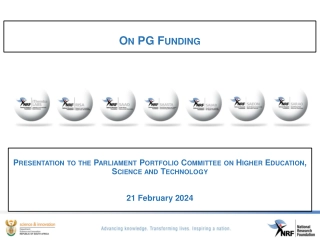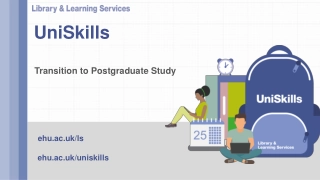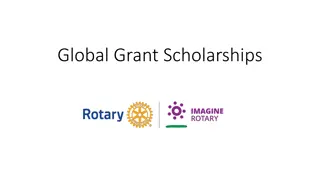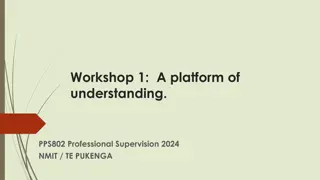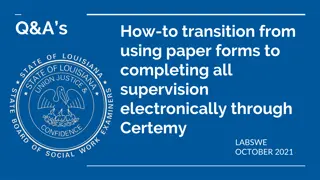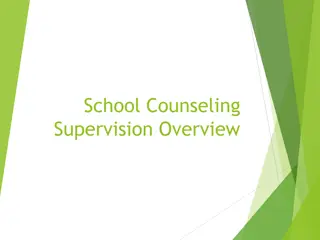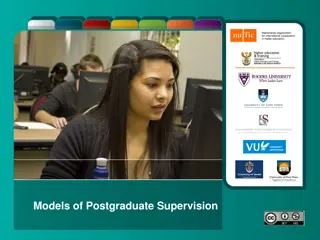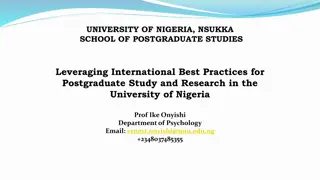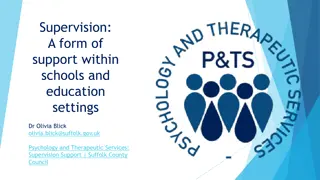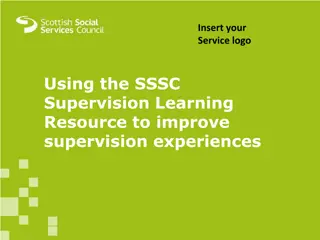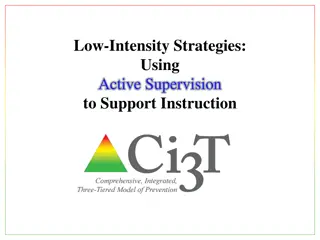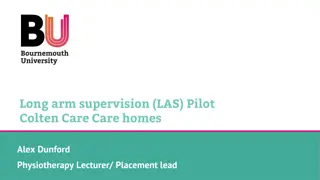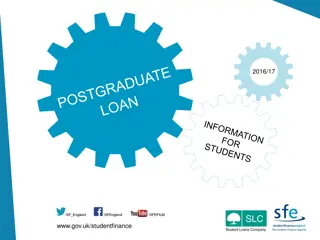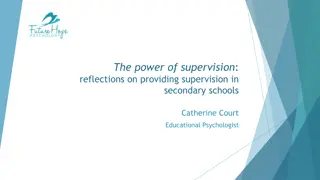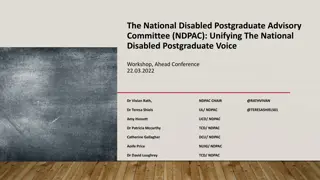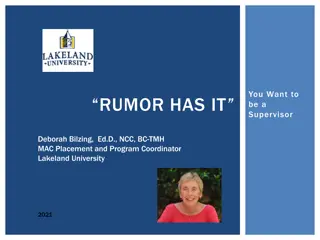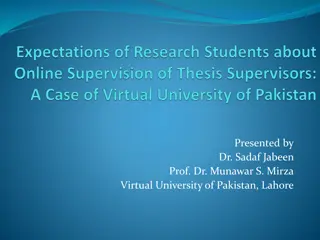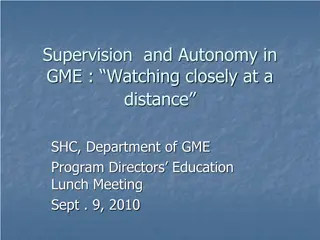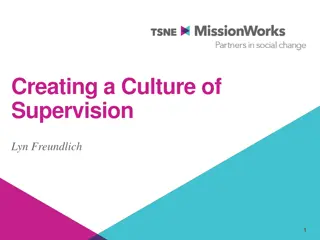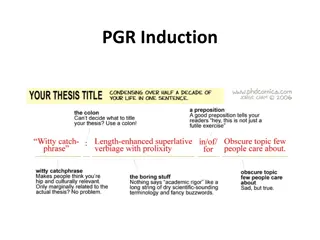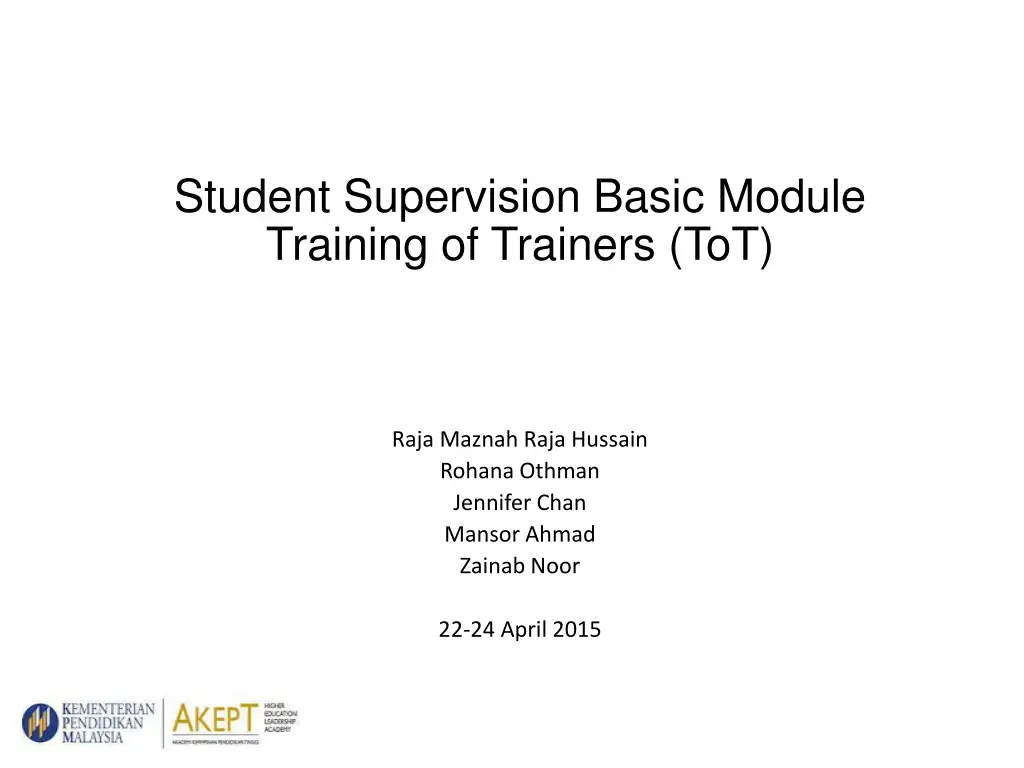
Enhancing Postgraduate Student Supervision: Insights & Reflections
Explore a training module for postgraduate student supervision covering philosophy, reflective questions, quality supervision practices, and more. Delve into the importance of doctoral supervision in higher education, understand the impact of supervision experiences on relationships, and learn how to provide quality supervision for successful PhD completion.
Download Presentation

Please find below an Image/Link to download the presentation.
The content on the website is provided AS IS for your information and personal use only. It may not be sold, licensed, or shared on other websites without obtaining consent from the author. If you encounter any issues during the download, it is possible that the publisher has removed the file from their server.
You are allowed to download the files provided on this website for personal or commercial use, subject to the condition that they are used lawfully. All files are the property of their respective owners.
The content on the website is provided AS IS for your information and personal use only. It may not be sold, licensed, or shared on other websites without obtaining consent from the author.
E N D
Presentation Transcript
Student Supervision Basic Module Training of Trainers (ToT) Raja Maznah Raja Hussain Rohana Othman Jennifer Chan Mansor Ahmad Zainab Noor 22-24 April 2015
Unit 3: Introduction Introduction to to Postgraduate Postgraduate Student Student Supervision Supervision
Learning outcome: Explain personal philosophy on student supervision at postgraduate level Learning and discussion activities Assessment : write a reflection paper (5%) of your philosophy on student supervision
Postgraduate Supervision in Higher Learning Institutions In the national and international Higher Education (HE) agenda, doctoral studies and more specifically doctoral supervision are acquiring a big significance and value. Important to develop training programs which can suitably respond to both doctoral supervisors and students needs. Essential to give doctoral education supervision a regularly rethought and perspectives and findings are shared to stimulate an engaged debate. Baptista (2011)
Reflective Questions What was your experience with supervision as a student? In what ways does this influence your relationship with your supervisor In what ways will this influence you as a supervisor?
DESCRIPTION What happened? ACTION PLAN If it happened again what would you do? FEELINGS What were your feelings? *Gibbs Gibbs Reflective Reflective Cycle Cycle (1988) (1988) CONCLUSION What else could you have done? EVALUATION What was good or bad about the experience? ANALYSIS What sense can you make of the situation?
Providing Quality Postgraduate Supervision Li & Seale (2007) found that completing PhD can be a lengthy and complicated process that demands competence, commitment, time, energy and emotion from both supervisee and supervisor. Successful completion of a PhD depends on the quality of supervision and the interaction between supervisor and students
Do you want to see this? http://www.phdcomics.com/comics/archive_list.php 8
First Student Perspective This is just to let you know that Dr .s supervision of my thesis has been superb. His guidance has greatly helped my progress, and he has been extra ordinarily generous with his time. Before I even enrolled he provided me with detailed commentary on the written work I submitted. All his comment on my work have been clear and incisive., isolating problem and clearly defining areas of weakness. I have been amazed (and grateful) for the level of detail in his comments. The combination of encouragement and criticism in his comments work perfectly . Yet I also had a great sense of being free to explore and include whatever material I please.
Second Student Perspective My supervisor was away too much. He showed very little interest in my work. It was very difficult to get contact with him. Thesis drafts were not read properly only 2 or 3 marks on 160 pages of text. I felt frustrated and directionless all the way through. For students like me their supervision is so poor that they would be better off without it. Staff are too busy with their own affairs the attitude is sink or swim .
Third Student Perspective After seeing C s comments, a total destruction on my confidence. Made me feel totally incompetent. I felt totally deflated
Common Criticisms of Supervisors Too few meetings with students Lack of interest in student Lack of interest in topic Too little practical help given Too little direction Failure to return work promptly Absence from School/Faculty Lack of research experience Lack of relevant skill or knowledge
Examiner Perspective I ve examined some really bad PhDs. Bad because I think its largely attributable to imperfect supervision. I ve read PhDs where I think, well how did a supervisor let that through? How dare they! it poses a real dilemma for me because it s a very big thing to fail a PhD. I ve actually passed a crappy ones and I feel angry about it really (Rowse, 2001)
Activity Activity 1 1: : Student Centred Supervision (SCS) vs. I-Centred Supervision (ICS)
Activity 1: Student-Centred Supervision (SCS) vs I-Centred Supervision (ICS) SCS - Students have total freedom to choose their research topic, methodology and theoretical framework. Students determine the direction of their research, supervisors are there to facilitate their progress and ensure completion in time. ICS Supervisors have total autonomy to decide on students research topic, methodology, hypothesis and mechanism for data collection (providing tools and lab facilities). Supervisors determine the direction of students theses, students must comply with the demand of supervisors to ensure completion of research in time.
Activity 1: SCS vs. ICS Pair yourself with someone standing close to you. Find out more about this person regarding his/her research interests and experience in supervision (10 mins). Stand in line based on your inclination, on one end (far right), those inclined towards SCS and on the other end (far left), those inclined towards ICS. Facilitator will decide on the mid- point as a virtual division between SCS and ICS Form a line between two spectrum, i.e., SCS and ICS Discuss with your partner these issues (10mins): Decide on your stand again, have you changed your mind regarding your role as supervisor? If you have, please choose a new position now. Using the white board Members of the SCS and ICS groups will share within the same group (10mins). SCS - Can we determine the direction for students research? Why or why not? ICS - Can we allow students to determine the direction for their research? Why or why not? Conduct an interview with the closest person beside you regarding his/her stand. Write down a one-page reflection on your experience in this activity and justify your stand Facilitator will debrief with regards to supervision approach. Compile the reflection into your teaching portfolio
Reflections on Supervision practice Enhancing Supervision Skills through Reflective Practice
Introduction Research supervision is the most advanced level of teaching in the educational system (Connell, 1985) According to Conrad (1999) and Delamont et al., (1997) The supervisory process: crucial to the success of research students Complex, subtle, pivotal and responsible Primary goal of research supervision is to develop research candidates as capable researchers The changing scenario of research supervision reinforces the need to develop reflective practice to enhance supervisory skills of supervisors (Holbrook & Johnson, 2000) According to Zhao (2003) research supervisors should go through a reflection process in which they reflect on their own current and past experiences in undertaking research when providing students with research advice.
Reflection Questions What is supervision? What is reflection? What is reflective practice? Why the need for reflective practice in practice? How might reflective practice contribute to your supervision practice?
Supervision Supervision is a forum for reflection and learning. It is an interactive dialogue between at least two people, one of whom is a supervisor. This dialogue shapes a process of review, reflection, critique and replenishment for professional practitioners. (Davys & Beddoe, 2010,p.21) Supervision aims to facilitate student s reflection so as to deepen their understanding on the practice experience (Davys & Beddoe, 2009) Supervision is driven from the experience of learner ( the supervisee) rather than from the wisdom and knowledge of the supervisor (Davys & Beddoe, 2009) Research Supervision is a process of fostering and enhancing learning, research and communication at the highest level (Laske and Zuber-Skerrit, 1996)
Reflection Reflection is the ability to examine, to observe, to look at, to review, to evaluate, to interrogate, to assess, to question and to own. [Carrol & Gilbert, (2004), p.64] Reflection is a fusion of sensing, perceiving, intuiting and thinking related to a specific experience in order to develop insights into self and practice. It is vision driven, concerned with taking action towards knowing and realising desirable practice [Johns & Freshwater, (2005), p.2] Reflection is a process of internally examining and exploring an issue of concern, triggered by an experience, which creates and clarifies meaning in terms of self, and which results in a changed conceptual perspective [Boyed & Fales, 1983),p.113] the practitioners ability to access, make sense of and learn through work experience, to achieve more desirable, effective and satisfying work (Johns, 1995) the conscious bringing to the surface of different forms of knowledge while attending to the thoughts and emotions present in the student both in the situation and after the experience (Kondrat, 1999 in Chinnery & Beddoe, 2011)
Reflection becomes reflective practice (only) when the critical reflection shapes future practice (Scaife, 2010., p.2)
An active process Requires a bird s eye view in which reflectors can include themselves Goes beyond the description Characteristics of Reflective Practice Requires reflectors to critically examine and evaluate their experiences, & to stay open to alternative possibilities even if fundamental beliefs are brought into question Exploratory It involves reflectors responding to questions
What is critical reflection? Questions the reflection, critiques the thinking, the perspective, looks for what is not there /not said, considers what could be and reviews all of this for implications on future actions What is Reflective Practice? a means of enhancing learners critical and reflective abilities. (Schon, 1987) the practice of learning from experience or experiential learning (Zhao, 2003) ability to reflect on experiences , to employ conceptual framework, and to relate these to similar and dissimilar contexts to inform and improve future practice (Zhao, 2003)
Research Supervision Reflective Practice *Why reflect in Supervision? Why reflect in Supervision? Experience is never innocent [Avis, (1995) in Butler, (1996),p.274] In order to reveal insightful new perspectives on the problems and inconsistencies that are inherent in supervisory practice, supervisor need: to reflect on his/her own practices compare to the practices of others
What is learning? Learning is the process of . Transformation of experience through reflection Improve practice through reflection Learn from the experience and develop knowledge to guide future practice
CONCRETE EXPERIENCE concerned with something that has happened to you or that you have done ACTIVE EXPERIMENTATION REFLECTIVE Kolb s Learning Cycle Cycle concerned with trying out the new ideas as a result of the learning from earlier experience and reflection. concerned with reviewing the event or experience in your mind & exploring what you did & how & others felt about it. Kolb s Learning ABSTRACT CONCEPTUALISATION concerned with developing an understanding of what happened by seeking more information & forming new ideas about ways of doing things in the future
What are the Benefits of Reflective Practice? Supervision relationship Emotional competence Supervisee as learner Supervisor as facilitator Curiosity & exploration
What are the obstacles of practicing Reflective Practice Finding time to do it Different learning styles different ways of tackling reflection Fear of seeming incompetent Fear of judgment Persistent of traditional ways Organizational culture Management of risk
Activity 2: Reading the article(15 mins.) 1. list down the main points of the article Michael Carrol. Supervision: Critical Reflection for Transformational Learning, Part 1 The Clinical Supervisor, 28:210-220. 2. Feedback on the article and state how you will reflect on your student supervision practice. 3. Present and share with the class and participate in the discussion on how you can improve your supervision skill for quality supervision practice
Activity 3: Writing My Activity 3: Writing My Philosophy of Supervision Philosophy of Supervision (20 min) (20 min) A teaching folio begins with a philosophy statement and meta- analysis of what teaching and supervision means to you as academics. Here is an exercise to write an initial Philosophy of Supervision. What is a statement of Philosophy? A self-reflective statement of your beliefs about supervision A document that helps you reflect on and improve your supervisory practice In this activity, you will be able to: Discuss how you put your beliefs into practice Provide real examples of what you do or anticipate doing in supervising your students
Reflection on todays Reflective Practice What happened? Did it meet my expectations? What needs to happen for next time?

